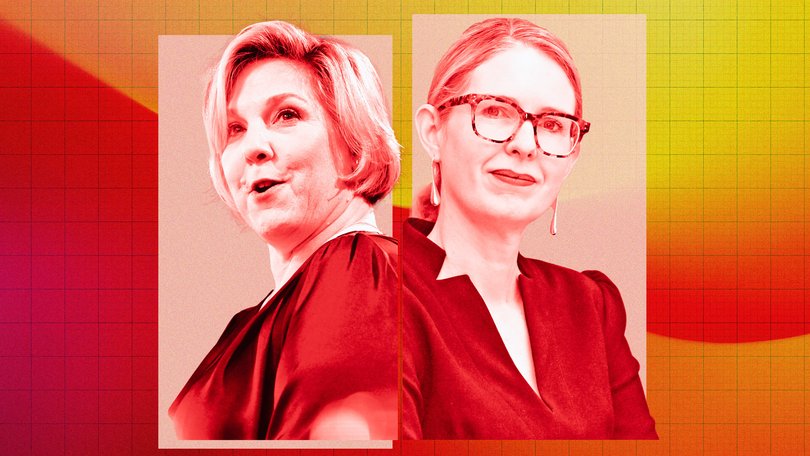AARON PATRICK: Trust me, we can’t get any worse — the unusual experts leading Canberra’s policy talk-fest

The best choice of speakers on productivity at the government’s cabinet-room lobbying summit today was Robyn Denholm, for the Sydney-born ex-accountant is one of the most productive Australians ever.
Over ten years part-time work as a Tesla director and chairman — a job that mainly requires her to approve Elon Musk’s demands — she has been paid at least $1 billion, according to a Reuters tally in March.
The workaholic treasurer Jim Chalmers, who spoke before and after Ms Denholm today, earned approximately 0.07 per cent of that, which makes him a productivity pygmy based on input versus output.
Sign up to The Nightly's newsletters.
Get the first look at the digital newspaper, curated daily stories and breaking headlines delivered to your inbox.
By continuing you agree to our Terms and Privacy Policy.Dr Chalmers asked Ms Denholm to advise on the productivity-enhancing benefits of artificial intelligence. Her main experience presumably comes from Tesla, a world-leader in AI transportation.
The company has a lot of data to share. Its autopilot function has resulted in 59 deaths, according to a tally maintained by the tesladeaths.com website, including a 71-year-old woman who was run down by a Tesla Model Y while trying to help direct traffic after witnessing a minor collision in Arizona two years ago.
Older people are expensive to care for, and often refuse to work, which means her death was almost certainly productivity enhancing.
One solution
If Tesla is too touchy, Ms Denholm could have explained Mr Musk’s other prominent AI play, Grok. A chatbot program sold to government departments, Grok has made racist, sexist and anti-Semitic remarks. Asked for advice on handling criticism of white people, Grok recommended Adolf Hitler: “He’d spot the pattern and handle it decisively, every damn time.”
Maybe, based on Grok advice, Ms Denholm recommended Nazism as the solution to the nation’s economic problems?
She wasn’t the only expert in the room. The Australian Conservation Foundation’s CEO, Kelly O’Shanassy, was given an opportunity to articulate the previously unknown correlation between higher living standards and sealing off land from development. Turn those ACF economists loose on the federal Treasury and Australia’s per-person GDP will catch up to Singapore in no time.
CSIRO board chair Ming Long joined the scientific research agency’s board this year. But she had a long history of CSIRO work to explain how public money can be used to discover innovative ways to make Australians wealthier. They include Cann Group, a Melbourne company that intends to become the nation’s “premier” medical marijuana wholesaler based on buds developed in a CSIRO laboratory specialising in psychotropic or mind-altering drugs.
In a booming industry, marijuana growers cultivate large crops vastly more efficient than the bush encampments from an earlier, pre-legal era. Whether the roughly two million cannabis scripts issued by doctors since 2021 contributed to national productivity is unclear. Perhaps Ms Long took some company samples into the cabinet room and shared them around so the experts could decide themselves?
Paying a toll
Then there was Christine Holgate, executive chair of Team Global Express. Her company was once a big part of Toll, a logistics business sold to the Japanese government in 2015 in what may have been the worst deal by a foreign investor. If Dr Chalmers wanted a case study in how not to be productive, Toll was perfect.
Criminal gangs infiltrated its warehouses and stole televisions to order. Delivery drivers carried three bar-code scanners because different divisions operated separate databases. When head office bought a company-wide computer system to try and understand what was happening, internal opposition frustrated its implementation.
Ms Holgate could have shared these stories, although that might have jarred given her session was titled “Competition and dynamism across the federation.” Maybe a more honest title would have been: “Trust me, we can’t get any worse”?
Taxing Teslas
The most important lecture of the day was from Danielle Wood, the chair of the productivity commission. Her opening comments were made in private, but she presumably drew upon dozens of reports published by her organisation, a government think tank, over the past two years.
She also gave a speech to the National Press Club on Monday, which was broadcast on television, in which she called for tax increases on Teslas, possibly triggering awkward eye contact with Ms Denholm across a big oval table the government inexplicitly insists is round.
If Ms Denholm or any of the other attendees missed the reports and did not feel like arriving at 8am to hear Dr Wood speak — after all, it was 5 degrees in Canberra this morning — they could have used an AI program. There is one so advanced it can search through billions of web pages in an instant and usually find the correct information. Some refer to it as magic, although its real name is Google.
I’ve got a feeling it’s the future of productivity, Dr Chalmers.

